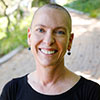#AWP20 Featured Presenter Q&A with Katharine Coles
AWP | February 2020
Event Title: Field Work: Poetry, Science, and STEM, Sponsored by Poets House
Description: We present a reading and discussion that will look at how poetry aligned with science learning can help us observe more of the world, creating new pathways to knowledge. We will showcase contemporary poets who have made a life practice of aligning science and literature, who will talk about the project model, outcomes, the creation of poetry paths in host cities, and the process of animating increased ecological stewardship.
Participants: Katharine Coles, Alison Deming, Camille Dungy
Location: Hemisfair Ballroom C3, Henry B. González Convention Center, Ballroom Level
Date & Time: Friday, March 6, 12:10 p.m. to 1:25 p.m.
Q: What are some of the conference events or Bookfair exhibitors you look forward to seeing at AWP?
It’s always hard to choose among the panels. There are many tributes I want to attend—those for people we lost this year, including Stanley Plumly, who was my teacher; James Tate; and W.S. Merwin; the celebration of David Baker’s tenure as poetry editor of the Kenyon Review. I also look in particular to “That’s Hot: Women Poets Take Back the Sonnet,” “It’s Not Ekphrastic: Contemporary Poets, Contemporary Art,” “The Evolution of Truth: How Nonfiction has Changed Over Time” in nonfiction, “Who Says?” about sociopolitical poetry, and “Pre-Apocalyptic Writing,” assuming we are still pre-apocalypse by March. I like to attend as many panels featuring my University of Utah colleagues and current and former students as I can. And every year I make it a goal to walk the entire Bookfair at least once, stopping of course at the tables for Quarterly West, Western Humanities Review, and other Utah journals; and taking time to hang out at the Red Hen and Turtle Point Press tables. I especially like running into old friends as I walk.
Q: What do you remember most about your first AWP? What advice would you give to an AWP first-timer?
Well, my first AWP was in (I think) 1979 at the Edgewater Inn in Seattle, and I am told the conference organizers were instructed afterward that they wouldn’t be allowed to return. Those were wilder days, and the conference was largely an opportunity for (mostly male) writers to practice wildness away from home, so I think it’s best if I don’t say too much, even about Ken Kesey’s impassioned account of W.S. Merwin protecting his wife from an attack by the head of a poetry program with a broken-off bottle.
As for first-timers, I’d advise them to pace themselves, make a schedule for each day that includes a little rest time as well as time to socialize. Also, I’d advise them to keep their heads. There will be a lot going on.
Q: What is your favorite AWP conference memory?
There have been so many panels I’ve loved, over so many years, I can’t possibly say. However, the times that give me the warmest feelings involve drinking wine and eating great food with my old friends from graduate school and newer friends who have grown close along the way. A couple of years ago in Seattle, Scott Cairns cooked an amazing paella for a bunch of us, in a tiny rented apartment. I also love the satellite readings.
Q: What book or books that you’ve read over the last year would you most highly recommend?
I keep getting sucked back into Dickinson. Newer work I’ve loved includes American Sonnets for My Past and Future Assassin, by Terrance Hayes, which is a tour-de-force; and Susan Briante’s The Market Wonders.
 Katharine Coles’s seven collections of poems include, most recently, Wayward (Red Hen Press, 2019). Poet-in-Residence at the Natural History Museum of Utah and the Salt Lake City Public Library for the Poets House program Field Work, she traveled to Antarctica in 2010 to write poems under the auspices of the National Science Foundation’s Antarctic Artists and Writers Program. She is a Distinguished Professor at the University of Utah, where she is founding co-director of the Utah Symposium in Science and Literature and is currently working with an interdisciplinary team to launch a minor in Dark Skies Studies at Utah. She has received awards from the NEA, the NEH, and the Guggenheim Foundation.
Katharine Coles’s seven collections of poems include, most recently, Wayward (Red Hen Press, 2019). Poet-in-Residence at the Natural History Museum of Utah and the Salt Lake City Public Library for the Poets House program Field Work, she traveled to Antarctica in 2010 to write poems under the auspices of the National Science Foundation’s Antarctic Artists and Writers Program. She is a Distinguished Professor at the University of Utah, where she is founding co-director of the Utah Symposium in Science and Literature and is currently working with an interdisciplinary team to launch a minor in Dark Skies Studies at Utah. She has received awards from the NEA, the NEH, and the Guggenheim Foundation.
